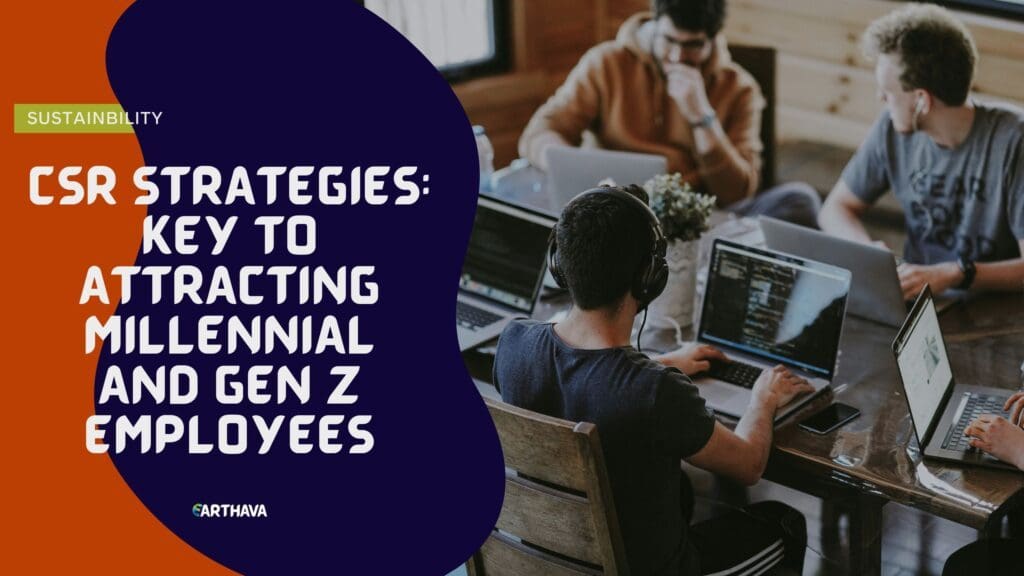It’s no secret that companies want to attract the best talent. But in today’s competitive job market, that’s easier said than done. So, what should organizations looking to appeal to millennial workers focus on?

Sustainability.
These days, sustainability is an increasingly important factor in attracting and retaining top talent. In fact, many employees consider an organization’s approach to sustainability and weigh it heavily when deciding whether or not to take a position.
Together, sustainability and corporate social responsibility (CSR) can attract quality employees. Organizations can optimize their green business plan to edge out the competition and appeal to top talent.
Why Do Sustainability and CSR Matter?
Sustainability experts advise businesses to focus their efforts on the “3 P’s,” which are people, planet and profit. Forbes contributor Chuck Leddy describes this philosophy as the idea that by taking care of the community and planet, businesses can also drive profitability.
The “3 P’s” concept is especially important when it comes to inspiring millennial workers. In order to attract and retain employees who care deeply about the environment, companies must focus on and showcase their sustainability efforts.
Employees care about sustainability

Studies show that sustainability is an important factor in attracting and managing talent.
Following a survey of 750 employees across industries in Brazil, China, India, Germany, the UK and the U.S., Bain & Company reported that nearly two-thirds of respondents said sustainable business is important to them.
Smart Company contributor Gary Smith writes that, in sustainability-focused organizations, employees and potential new recruits are more loyal and productive. He recommends that all companies, whether or not caring about sustainability is a part of their core business, to embrace CSR.
CSR attracts top talent
Embracing CSR and adopting sustainable business practices are powerful ways to attract top talent and build a more committed, hardworking team, according to Smith. It’s one of the reasons environmentally friendly businesses are thriving.
Even though the benefits of sustainability are numerous, many companies are failing to make use of this opportunity to attract top talent and fully engage their employees. According to the Bain & Company survey, just one-third of respondents described their own employer as a clear leader that has fully incorporated sustainable practices.
A growing number of employees place significant importance on CSR, but for the time being, few organizations fit the bill. By stepping up and integrating sustainability, companies (even ones with a smaller payroll) can set themselves apart in the job market and attract top talent.
Millennials want to make a difference
Millennial workers especially value sustainability. This generation wants workplaces to contribute positively to their communities and the world, according to Western Governors University. Many are even willing to accept lower compensation to work for a company with a strong sense of CSR.
For many millennials, working for an organization that meshes with their beliefs is more important than a big paycheck. This trend should open companies’ eyes to the financial benefits of adopting sustainable practices in their business.
How Can Companies Integrate Sustainability?
Bain & Company employee Jenny Davis-Peccoud recognizes that top talent is in short supply throughout many industries. She believes articulating a “nobler mission” for a company can be a powerful weapon in the war for talent.
Sustainability can be that “nobler mission.” There are several steps companies can take to integrate sustainability.
Analyze business operations for sustainability
First and foremost, Leddy advises companies to make their business operations sustainable. It’s a good idea to involve current employees in this process. Companies should consider establishing a program that rewards and recognizes employees who go the extra mile to reduce waste and save resources.
For example, a company could come up with a way to incentivize water conservation. Employees could earn rewards for showcasing water-saving best practices such as promptly reporting leaks.
When a company invites its employees to get involved, great things happen. In 2007, the UK-based Marks & Spencer set the goal of being the most sustainable retailer in the world by 2015. Employees got behind the mission, and the head of technology of clothing came up with a way to combat the huge volume of garments that the company was throwing away every year.
The employee, Simon Colbeck, suggested partnering with the nonprofit Oxfam to resell used clothing instead of tossing it in a landfill. According to Davis-Peccoud, the move resulted in 4 million pieces of clothing being recycled each year, millions of pounds raised for Oxfam and a rise in customer traffic for Marks & Spencer.
Understand how products and services affect the environment
Second, if a company is going to have a CSR program that does more than just look good on paper, Smith suggests that companies take a hard look at the products and services they offer. How do they affect the environment?
As more employees adopt eco-friendly habits and green lifestyles, they want to know their employer is doing the same. Smith advises companies to look for ways to improve the sustainability of the supply chain as well as analyze how any harm that is occurring can be minimized.
Companies can involve employees in this process. A Scandinavian energy company, Statoil, nominates 10 senior executives each year to take part in a year-long climate and energy program. Davis-Peccoud writes that the program educates these senior executives on how to identify and address environmental issues from their position in the company.
Promote volunteering with causes that matter to employees
Last, Leddy suggests promoting volunteering. This is another opportunity for companies to engage with current employees and potential recruits. Company leaders can inquire about the causes and nonprofit groups that matter to employees. From there, Leddy advises companies to coordinate volunteer outings once a quarter or twice a year.
Developing a Reputation for Sustainability
Of course, companies can’t just sit back and hope top talent hears about their commitment to sustainability and CSR.
As a company takes steps toward sustainability, Leddy writes that they should be spreading the news. One smart place to showcase CSR is on a company website. Other opportunities include local newspapers and TV stations.
Companies must get the word out about their efforts in order to develop a reputation for sustainability. Only then can they hope to win in the battle for attracting employees.


